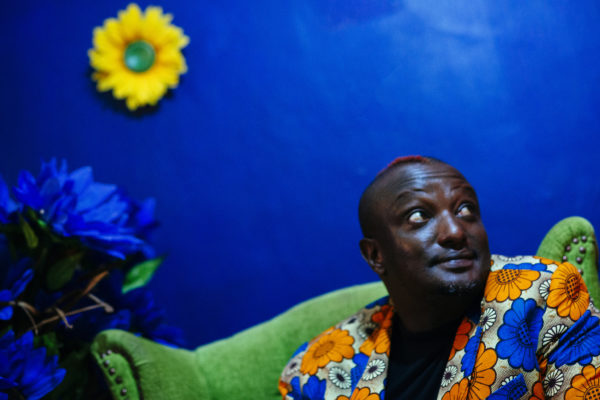
Inspired by Lara Abiona’s beautiful birthday tribute to Binyavanga Wainaina here on Brittle Paper, we asked six writers—Linda Musita, Kiprop Kimutai, Saddiq M. Dzukogi, Arinze Ifeakandu, M.V. Sematlane, Otosirieze Obi-Young—to pen thank-you notes to a man who, in being a fearless pioneer, has made considerable impact on the African literary and cultural scene.
By Linda Musita:
Before writing this I thought about you and the constant tick was how I have treated you/what I have said about you in private conversations with other people. Lord knows we all say things about you in DMs and inboxes that we wouldn’t say to your face. Good and bad things, depending on what you do or say. Then I thought about how you treated me in private conversations. It was just once. In January 2014 when you sent me a DM and said you liked my fiction; some crazy-abnormal-shameless stories on my Akhatenje blog. That DM gave me the license to write what and how I wanted. You gave me the courage to keep indulging my mind without feeling ashamed. Incidentally, that DM was also the prompt for my Africa 39 application. I can’t say enough about what Kwani? has done for my writing directly and indirectly; the events, the workshops, the space and opportunities it has given writers leading to the creation of platforms like Jalada, which I am a proud member of. You are an upright person in private and in public. And the rest of us, who you have helped unconditionally and unwittingly, should be as upright and forthright because what the fuck would we do with our lives if you were not born? Well, I would still be a politically correct coward. Happy birthday Binyavanga, the world is still yours.
Linda Musita is a Kenyan writer and editor. She runs an independent publishing house in Nairobi (Lesleigh Kenya) and is also a member of the Jalada writers collective; and a 39er. Linda occasionally blogs about her fave reads on [email protected].
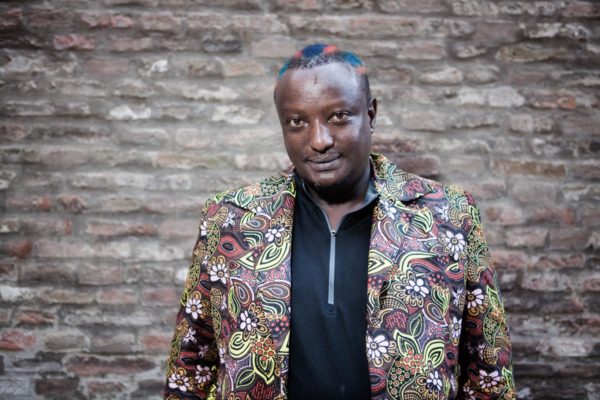
By Kiprop Kimutai:
I once told Binyavanga that he was a force of nature. His energy overwhelms and builds those around him. Through Binyavanga, I went to Farafina. He told me that Chimamanda would not mind reading my stories. I went out with him in Lagos, from Ikoyi to Surulere, where he introduced me to fascinating writers—Eghosa, Igoni, Mazi—and to their homes. He told me it was critical for me to embrace all my demons, then transcend them, because only then can I call myself a writer. Before that, I am only writing compositions. Binyavanga is kind. He always listens. But will interrupt when you are talking bullshit. He wants you to be honest about your life, your experiences, your circumstances, your hopes. Because he is honest with himself.
Kiprop Kimutai is an editor with Jalada Africa, which is a Pan-African Writers’ Collective, who has published eight online anthologies with themes ranging from insanity to Afro-futurism. He believes that if he had been born in Salinas, California, he would have turned out as a re-incarnation of John Steinbeck. He is a Kenyan, and was the second runner-up for the Kwani? Manuscript Project. Aside from the 2015 Caine Workshop, he has participated in Chimamanda Ngozi Adichie’s Farafina Workshop in Lagos.
By Arinze Ifeakandu:
His reputation preceded him. They called him “The Force of Nature” and, affectionately, “The Binj.” Told us that when he came we would know. Man after man walked into the Workshop room, day after day. “Is that Binyavanga?” I asked. No. When he eventually walked in, he filled the door, a man with a glowing dark skin and softly feminine eyes. His hair, painted spikes. I did not need to ask who he was. After the first class, perhaps because he felt guilty torturing us, he asked, after lunch: “Coke? Energy drink?” And paid. Because he spoke with a peculiar expressiveness, arms dancing, face gliding through expressions, I watched him closely. We had discussed “Discovering Home,” and I had said, “Nothing really is happening, and yet we are invested because of the language.” And the facilitator agreed: she had actually recommended it to trigger a conversation about how stories can thrive merely on sentence. Our facilitator gazed at him with open awe, and because I was in awe of her myself, I watched him more closely and felt myself float on his words. When The Binj gave out comments, he said to me, “Your work is so beautiful. Would you like me to email you my thoughts?” And because he said it with tenderness, my stomach fluttered.
Recently, I went back to his videos and saw, in his laughter, a certain sadness. He was talking about Africa, how our imagination has been stifled. In his gently feminine eyes, I saw the finger of love.
Arinze Ifeakandu was born in Kano and studied Literature in the University of Nigeria, Nsukka, where he was editor of The Muse No.44. He is a 2013 alumnus of the Farafina Creative Writing Workshop. His short stories have appeared in a Farafina Trust anthology and in A Public Space magazine where he was an Emerging Writer Fellow in 2015. He was shortlisted for the 2015 BN Poetry Award.
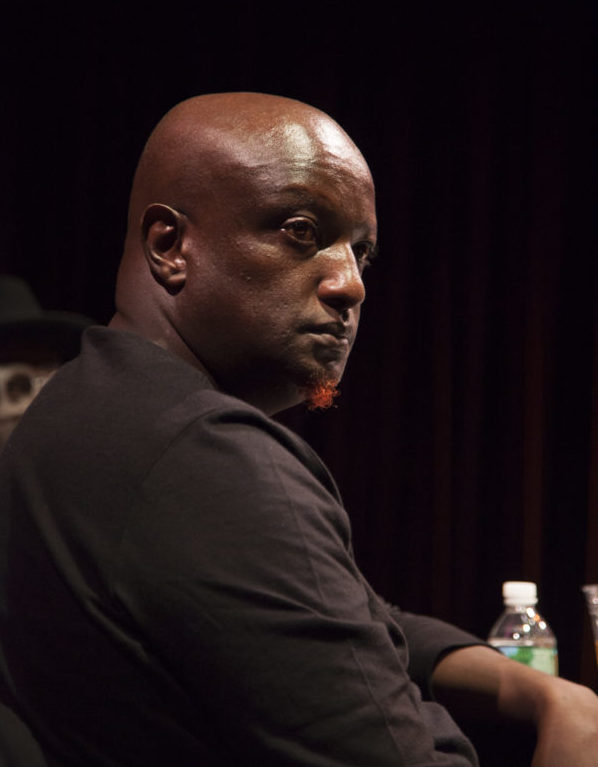
By Saddiq M. Dzukogi:
Binya is an incredible human being that has got a heart, committed to making humanity happy. Looking at him, you see a person who cannot be stopped from his dreams. Nothing can stop him, not even his own body. See him and the stroke, it only increased his capacity to embody love for others and give comfort to those who are in need of it the most. I am not sure Binya will be happy, my telling this story, but I am sure he agrees that every story needs to be told. Last year, my family and I, and of course Binya, welcomed my daughter Bahra into this world. Binya gave me more than his time, which is indeed priceless. He was asking on an hourly basis, and affording me support, and was somehow practically present with me in the Delivery Waiting Room, albeit inside my phone. He supported me mentally and even financially. We are yet to meet, but he continues to touch me with his big heart of kindness and love, as he does so many others. That is the kind of person he is, and for me, he is a model, the ideal African always trying hard to create space for other Africans to flourish and believe that their Africanness is a sort of gold to be cherished. Happy Birthday Binyavanga!
Saddiq Dzukogi writes from Minna where he works at the School of Languages, Niger State College of Education. He is also the poetry editor of Expound.
By Otosirieze Obi-Young:
It is four years now, and it has kept its place on my table: fourteen leaves of browned A4 paper, its prose often like razor—my copy of “Discovering Home,” the first African short story I ever printed out, that I now continually preserve partly out of need, partly out of nostalgia. Later that 2013, after my friend returned from Farafina Workshop gushing, waving about his One Day I Will Write about This Place, I sat down and Googled “Binyavanga Wainaina” for the first time. That evening, so taken was I by the man in my laptop, with his huge physical presence, his dyed hair and colourful skirt, his lovable accent and piercing eyes, that he seemed to me to be forged from something untouchable.
In the coming years, Binyavanga would fall ill, the formidable Binyavanga whose fights for the things he believed in erupted with so much ferocity that I imagined liquid steel running in his veins. Binyavanga, whose existence had always seemed one of unperformed style, would appear a shadow of his thick self. “I don’t understand,” my friend complained. My friend had experienced him up close, is a witness to his genius, and so was puzzled, troublingly worried. But Binyavanga is Binyavanga, had always been himself—a true leader, a towering pathfinder—particularly in the days after his coming out, the days in which he would become an icon not just of his cause but of a generation.
Otosirieze Obi-Young’s story, “Mulumba,” appears in The Threepenny Review. His Transition story, “A Tenderer Blessing,” was nominated for a 2015 Pushcart Prize. His “You Sing of a Longing” is shortlisted for the 2016 Gerald Kraak Award. He was shortlisted for a 2016 Miles Morland Scholarship. He is currently an editor at brittlepaper.com.
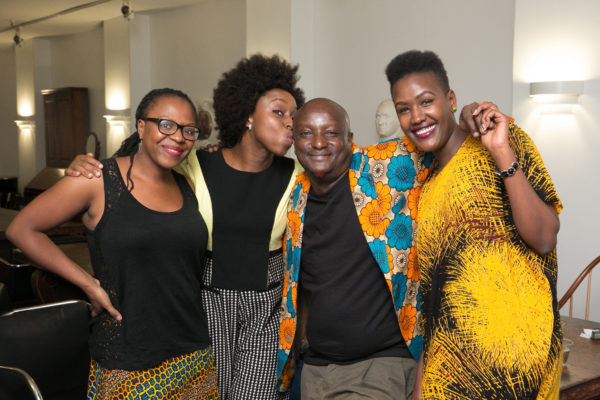
By M V Sematlane:
Writing, at its best, is always a lonely act. It’s lonely for the creator making and breaking worlds with words. The worlds can only be enjoyed in a state of loneliness. Words are powerful, but they are also jealous. They implore you to turn off the T.V. They implore you to shun social dates with friends. And all this to keep sacred the connection between the writer and the reader. At its best, the writer sends a smoke-signal out into the world, and can only hope that it reaches at least one person. At its best, one person will see this signal, a red, chemical smoke curling in the air. I was this person and Binyavanga Wainaina was my writer.
As a younger writer, I would fill my stories with characters whose names were Edward or Charlotte, almost all exclusively white, who lived in either New York or Britain, despite the fact that I hadn’t been to any of these places, and spoke with accents and related experiences that were light-years removed from mine. My writing was poorer because of this. I don’t know Binyavanga personally, but because I saw his smoke-signal once, I feel like I do. It was a smoke-signal that taught me what Pan-Africanism was. It was a smoke signal that taught me to be unapologetic about who you are as an artist, as an African, as a human. It was a smoke-signal that gave me permission to write about the things closest to me: Africa, my family, blackness. But the colors I recall most vividly from this smoke signal, are colors of bravery. What stands out to me most about Binyavanga is his constant battle for a Pan-Africanist culture, a constant battle against the patriarchal and bigoted structures of society. I thank him for this, though for me, a better “thank you” would be to continue his fight, and answer his smoke-signal the only way I know how: writing.
Moso Victor Sematlane is a 21-year old Mosotho writer who was born and lives in Maseru, a city in the tiny kingdom of Lesotho. Though small, the country is bursting with big ideas and a creative energy that tends to foster expression in all forms, whether it’s music, film or poetry. It’s in this milieu that Moso has gravitated towards the written word. His story, “Lesotho Is Like Stepping into a Frosty Fairytale,” is one of the most-viewed posts on Brittle Paper. You can follow him on twitter here: @Moso_Sematlane, and on Tumblr here: mvdarko.tumblr.com


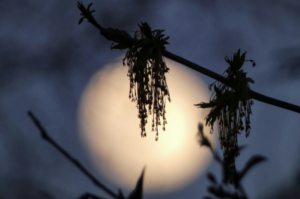

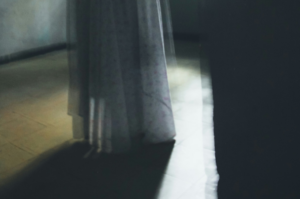




COMMENTS -
Reader Interactions